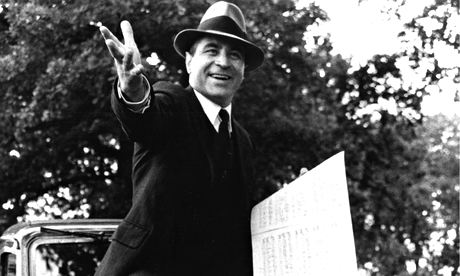
Bob Hoskins was a godsend for those TV shows that would feature footage of the work now-famous performers took early on to pay the bills. Shows such as Before They Were Famous. Because before he was on the big screen in films such as Mona Lisa, Who Framed Roger Rabbit? and The Cotton Club, Hoskins had played a removals man who sought help for his illiteracy in On the Move, a Sunday afternoon series of 10-minute dramas (screened in 1975 as part of the BBC's adult education remit).
This was the start of his TV career. And while audiences - especially in America - may have been amused to see these small beginnings of a subsequently huge career, Hoskins always spoke fondly of Alf, the character who learned to write late in life, in interviews.
There were two reasons for this. First, Hoskins was never one of those actors - of whom his close friend Michael Caine is an example – who, after making it in movies, later appeared on British TV only as a chatshow guest. Grateful to the medium for his early breaks and training in acting to a camera, Hoskins returned to television throughout his career and, although the obituaries inevitably emphasise his cinematic credits, made a succession of significant small-screen appearances over almost 40 years. It was fitting that one of his last major roles, before retiring after the diagnosis of Parkinson's disease in 2012, had been as a pub-owner - the main character in one episode, a background presence in another – in Jimmy McGovern's anthology series The Street.
The other reason, though, that Hoskins never disowned his TV work is that On the Move shared the qualities of his best stuff. Whereas most footage in Before They Were Famous type shows is calculated to be bathetic or embarrassing – the Oscar-winning actor who once advertised stubborn-stain remover – the characterisation of a proud man who has desperately disguised his learning difficulties helps to explain, when watched now, why Hoskins went on to become the star he did.
Handed a working-class stereotype (not for the last time in his career), Hoskins gave Alf a vulnerability and poignancy far beyond the requirements of a public information short. Apart from its intended audience of adults struggling with reading and writing, On the Move gained a large secondary following among literate viewers because, even then, Hoskins' expressive face and growly voice made you want to watch and listen.
As a kind and generous man, Hoskins also appreciated the ideological aspect of the project and treasured letters and comments from people who had sought belated education as a result of On the Move. He may have been thankful as well, at that stage of his TV career, to be playing a man who wasn't on his way to or from jail. As a short stocky bloke with a wheezer-geezer North London accent, Hoskins was, according to the class-driven stereotyping of the day, frequently cast on the wrong side of the law, as the titles of two early telly jobs – the 1972 drama Villains and the 1974 sitcom Thick as Thieves – vividly illustrate.
A classier early part was in Dennis Potter's Schmoedipus (1974), one of the writer's many spiritual-psychiatric fables and not the best of them, but significant because it gave the Potter team a familiarity with Hoskins that paid off when he was chosen as the co-star of the six-part masterpiece Pennies from Heaven (BBC1, 1978). Although the role was yet another criminal – homicidal song-sheet salesman Arthur Parker – this one was original rather than stereotypical, as the show featured Potter's daring device of actors miming to popular songs on the soundtrack: a premonition of the later karaoke craze, although intended by the writer as a metaphor for lying and hidden inner lives.
Part of the joke on first viewing seemed to be that Hoskins was a particularly unlikely bloke to be singing and dancing but, characteristically, Hoskins soon wrong-footed this assumption by hoofing and crooning for real in one of his stand-out stage appearances: as Nathan Detroit in Richard Eyre's 1982 National Theatre production of Guys and Dolls.
Hoskins's theatrical credentials also led to two of his strongest TV performances, playing two of the standout classical baddies: Iago in Jonathan Miller's BBC production of Othello (1981) and the scheming thug De Flores in Simon Curtis's version of Middleton's The Changeling (1993). Both parts demand the paradox of making evil plausible and even attractive and so were perfect for the actor's unusual combination of likability and menace. Curtis later cast Hoskins as an enjoyable Micawber in 1999's David Copperfield, a BBC adaptation that was also notable for introducing Daniel Radcliffe in the title role.
Rather less of a credit to Hoskins' credits were (presumably lucrative) turns in American mini-series as various short and burly historical figures - Pope John XXIII and General Noreiga. But, as he showed by returning to TV for The Street, Hoskins always retained an affection for the box and the feeling was reciprocated.
Most actors would like to be regarded as all-rounders, which is why so many movie stars - such as Tom Hanks or Billy Bob Thornton - occasionally dip into theatre or TV. But Bob Hoskins, who would have reacted to this compliment with a typically self-deprecating comment about also having been "all round", truly was an all-rounder: from adult illiteracy campaigns through Broadway musicals to Hollywood movies, he could do it all, and always watchably.

